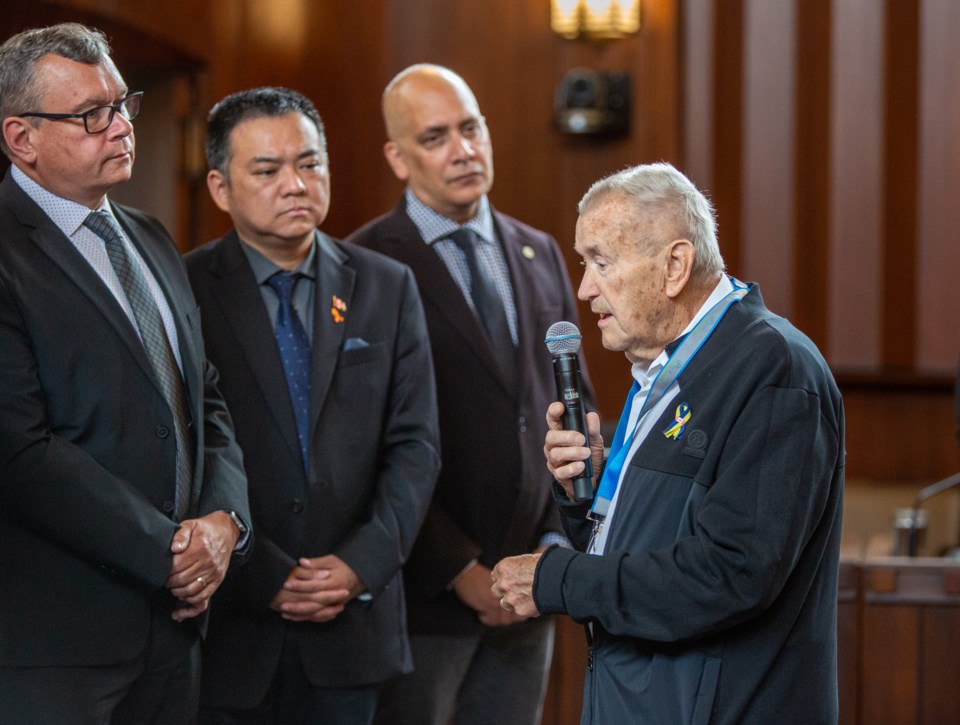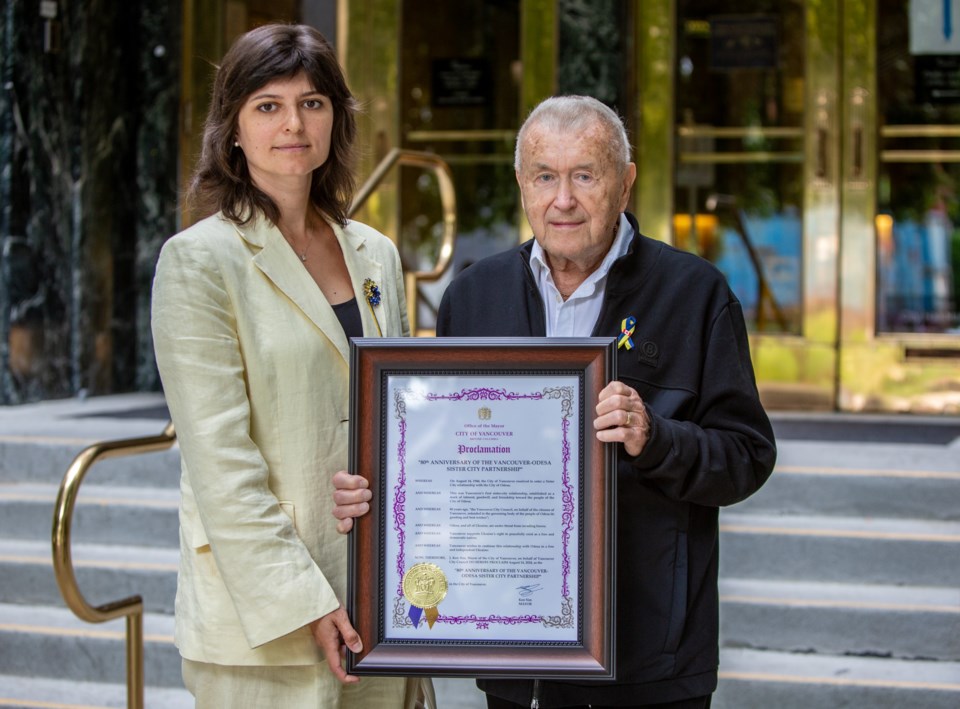The Honourary Consul General for Ukraine in B.C. was grateful to receive a proclamation Wednesday marking the 80th anniversary of Vancouver’s sister city relationship with Odesa, a port city on the Black Sea in Ukraine.
But Mir Huculak also used the event at city hall as an opportunity to remind councillors of two requests he previously made: the use of a civic theatre to hold a fundraiser for Ukrainian children living through wartime, and a spot in Vancouver to place a statue commemorating the Ukrainian Famine of the 1930s.
“Now, this is very nice — the proclamation, and the letter from the mayor — thank you very much,” said Huculak, standing in the council chamber in front of councillors who attended the event.
“But Ukraine is going through a terrible time. It needs all the help it can get, and especially Odesa, our sister city. If it was your sister, you'd do everything you can to help.”
'Bombing from Russia'
His requests were echoed by Iryna Shyroka, president of the Ukrainian Canadian Congress in B.C., in an interview following the event. Like Huculak, Shyroka said she appreciated the proclamation but emphasized the present needs of Ukraine.
“Odesa is under strong missile attacks, and under bombing from Russia as we speak,” she said.
“Many schools are being destroyed beyond repair. So we are appealing not only to the whole world, but at least to the sister city — Vancouver — for significant support. There was a reason why Vancouver is a sister city.”
Shyroka said money raised at a charitable event could be used to repair schools and build bomb shelters. Russia invaded Ukraine in February 2022, which has resulted in thousands of deaths, injuries and people fleeing the country, including to B.C.
BBC News reported in February 2024 that Ukrainian President Volodymyr Zelensky said 31,000 Ukrainian soldiers had been killed since the invasion, and that tens of thousands of civilians had died but the true number was unknown.
"I don't know how many of them died, how many were killed, how many were murdered, tortured, how many were deported,” Zelensky told BBC News.
An estimated 80,000 Vancouverites of Ukrainian descent live in the city, along with another 20,000 displaced people who arrived in B.C. after the invasion, according to Huculak and Shyroka.

Sister city relationship began in 1944
Vancouver and Odesa forged a sister city relationship in 1944.
According to the city, the relationship was founded on humanitarian grounds, with strong support from key community members in Vancouver who had family ties to the area.
During the Second World War, Odesa faced significant devastation, leading to a humanitarian crisis. The Ukrainian community in Vancouver organized clothing and other donations to assist the people of Odesa during this difficult time.
Over the years, there have been exchanges between Vancouver and Odesa, with economic and trade opportunities a focus. Documents from the City of Vancouver’s archives show a visit to Vancouver in 1995 from a delegation led by then-Odesa Mayor Eduard Gurvits.
Vancouver school students travelled to Odesa in 1990 in an exchange. Odesa students then travelled to Vancouver in 1991. At that time, the need for books was recognized by Vancouver city officials.
“After discussion, it was agreed that a target of 1,000 books would be sent and that the first shipment of books would be scheduled to arrive in conjunction with the students’ visit in March,” according to 1991 meeting minutes of the Vancouver-Odesa sister city committee.
That active relationship appears to have atrophied, according to Huculak.
“Vancouver, in the last 20 years, has done nothing about the sister city relationship,” he said, before pausing to consider his statement.
“Actually, it’s probably longer than 20 years. But nothing has happened until recently when they heard that it was going to be 80 years of a sister city relationship.”
Holodomor
He said a statue of a little girl commemorating what Huculak described as a genocide in the early 1930s in Ukraine sits in storage in a church at 10th Avenue and Main Street. The statue is important to Ukrainian-Canadians, he said.
“[The Soviet Russians] took away all the food, and people starved,” Huculak said of a time known as Holodomor, or the Ukrainian Famine. “They say close to six million Ukrainians starved, and that was in eastern Ukraine.”
Coun. Pete Fry, who attended the proclamation ceremony, said he only recently heard about Huculak’s request for use of a city theatre.
“For us to give up space would require some kind of commitment from council to say, yes, we approve this cost,” Fry said. “Personally, I'm OK with it, and I don't know that anybody on council necessarily opposes it.”
He acknowledged the delay in finding a place for the statue, saying it is an issue that continues to come up at events involving Ukrainian-Canadians.
Fry referred to council’s recent United Nations Declaration on the Rights of Indigenous Peoples (UNDRIP) agreement with the Musqueam, Squamish and Tsleil-Waututh nations in explaining reasons for the delay.
“Hopefully, now that we've signed on to an UNDRIP strategy, we can actually move forward on it,” he said.
“It is actually articulated in the UNDRIP strategy that we need to consult with [the nations] on those kinds of things, which is totally appropriate. I'm confident that the [the nations] would support something of this nature. We need to do it right. But let's get it done.”
Theatre cost, $10,255.64
The city’s communications team responded Wednesday to questions raised by Huculak at the proclamation event, saying the following in an email:
“The City of Vancouver values our enduring relationship with our sister city and the Ukrainian community. We appreciate the Honourary Consul General to Ukraine's request to use a Vancouver civic theatre at no cost to the Ukrainian community to support a fundraising initiative for Odesa.
“The budget estimate for this event, including staffing, was $10,255.64. Regrettably, the theatre rental grant, our sole in-kind rental provision for the Vancouver Civic Theatre, has its funds fully allocated for the seasons from Sept. 1, 2023 to Aug. 31, 2025.”
And regarding the statue:
“The city also appreciates the Honourary Consul General to Ukraine's request to have a statue placed on city lands.
“As was shared with the Honourary Consul General in December 2023, the city and park board are currently deferring consideration of new proposals for commemoration until the completion of a comprehensive commemoration framework, which is due to be presented for council consideration and decision in 2025.”
Asked about Vancouver’s current relationship with Odesa, the city said:
"While the relationship has been largely symbolic in recent years, it remains a testament to the strong historical ties and shared values between our two cities. We continue to value this connection and remain open to future opportunities for meaningful engagement.”






